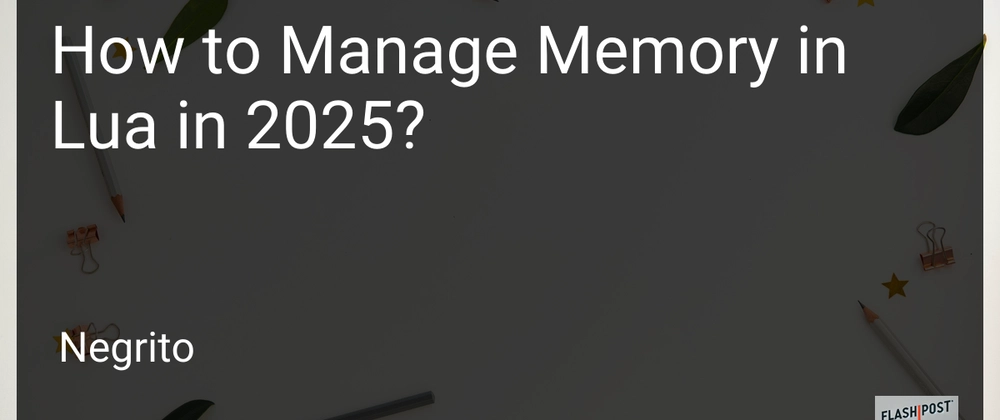As programming languages evolve, new techniques and best practices for managing memory emerge. In 2025, Lua remains a popular scripting language renowned for its efficiency and lightweight nature, common in game development and embedded systems. Proper memory management in Lua ensures not only better performance but also sustainability in maintaining applications. This guide will offer insights into effectively managing memory in Lua, ensuring your applications run smoothly.
Understanding Lua's Memory Model
Lua utilizes automatic memory management through garbage collection, which automatically handles the allocation and deallocation of memory. Lua's garbage collector is incremental, safeguarding applications from memory leaks by periodically cleaning up unused objects. While Lua's garbage collector reduces memory management burden, understanding and leveraging it can lead to more efficient applications.
Tips for Efficient Memory Management
1. Use Local Variables
To optimize memory usage, prefer local variables over global ones. Local variables are stored in the stack, which is faster and automatically cleaned up when no longer needed. This practice minimizes the need for garbage collection.
local function process_data()
local result = {}
-- Perform operations on result
return result
end
2. Optimize Table Usage
Tables are a critical data structure in Lua. Managing them efficiently can lead to significant memory savings:
- Reuse Tables: Instead of creating new tables, consider reusing existing ones.
- Pre-allocate Table Size: If possible, define the table size before populating it to minimize memory reallocations.
local reuseTable = {}
for i = 1, 1000 do
reuseTable[i] = i
end
3. Avoid Memory Leaks
Memory leaks can occur in Lua when objects are unintentionally kept alive. Here’s how to avoid them:
- Remove references to objects that are no longer needed.
- Be mindful of closures and upvalues that might retain more data than necessary.
4. Utilize the Garbage Collector
Lua allows for manual intervention with its garbage collector. You can control its behavior to optimize performance:
collectgarbage("collect") -- Manually collect garbage
collectgarbage("setpause", 200) -- Adjust garbage collection pauses
collectgarbage("setstepmul", 300) -- Adjust step multiplier
Advanced Techniques
1. Profiling Memory Usage
Utilize profiling tools to monitor your application’s memory usage. This helps in identifying bottlenecks and understanding memory patterns.
2. Custom Memory Allocators
For advanced users, implementing custom memory allocators can lead to better control and optimization. This approach is beneficial for applications requiring stringent performance and memory constraints.
Related Topics and Further Learning
To broaden your understanding of programming concepts related to Lua and memory management, explore these resources:
- Logic Programming Evaluation: Dive into Prolog and enhance your problem-solving skills with logic programming.
- Stock Valuation Analysis: Expand your analytical skills by comparing stock valuation models.
- Haskell Function Evaluation: Understand functional programming paradigms through comprehensive Haskell function evaluations.
Managing memory efficiently in Lua not only improves performance but also ensures the long-term sustainability of applications. By integrating these best practices and continually keeping up with evolving techniques, you can master memory management in Lua, setting your projects up for success in 2025 and beyond.



Top comments (0)